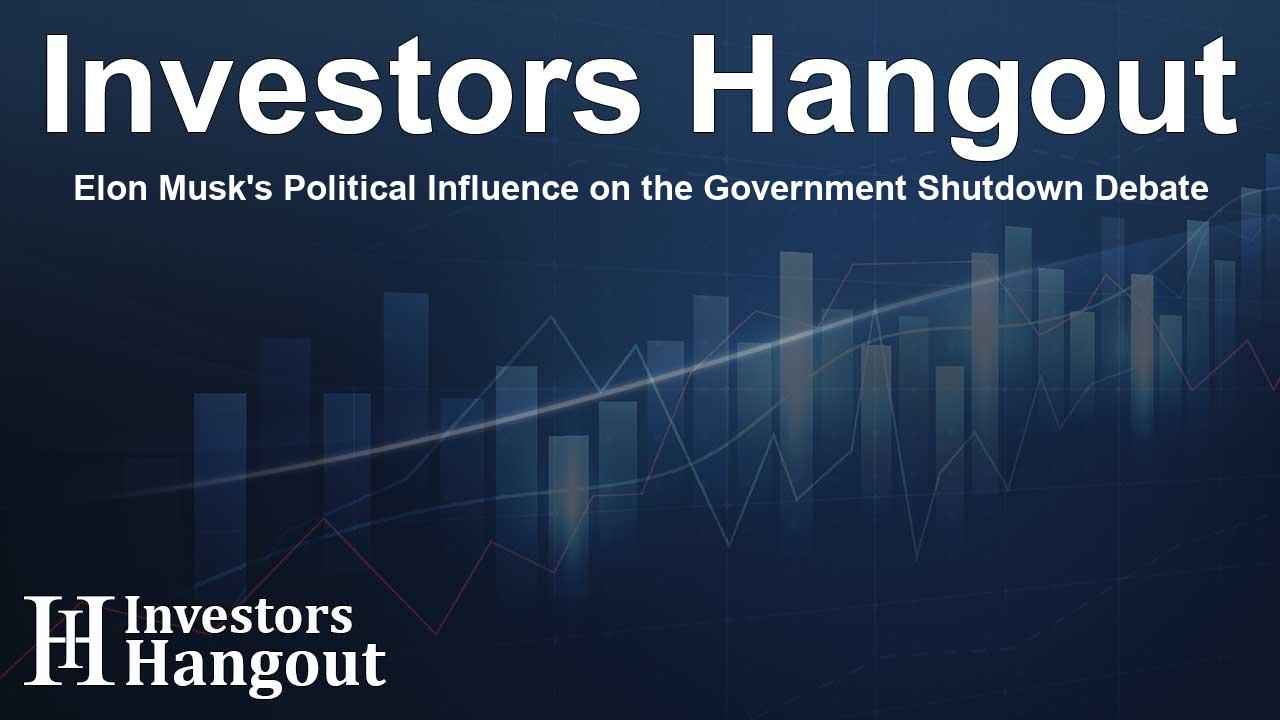Elon Musk's Political Influence on the Government Shutdown Debate

Understanding the Impact of Elon Musk
Elon Musk, the billionaire entrepreneur known for his ventures with Tesla and SpaceX, has increasingly found himself at the center of political discussions. His recent critiques of a bipartisan spending bill have sparked significant discord among lawmakers and highlighted the influence he wields in today’s political landscape.
The Government Shutdown Dilemma
As concerns over a potential governmental shutdown grew, lawmakers were seeking ways to negotiate a resolution. Musk's sharp remarks on social media, where he dubbed the proposed spending bill as 'criminal', ignited a storm of reactions, particularly among House Republicans.
Social Media’s Role in Politics
With his reach exceeding 170 million followers, Musk's posts did not go unnoticed. His provocative statements urged followers to apply pressure on Congress, reflecting a modern trend where social media rouses political activism. He later posted that any legislator supporting the spending bill risks losing their position in the next election cycle, which certainly made waves among the Republicans contemplating their votes.
House Speaker's Challenge
House Speaker Mike Johnson found himself in a challenging position, needing to galvanize enough support for the bill amidst the growing pressures created by Musk. Johnson believed he could persuade his colleagues to join the majority of Democrats in favor of the bill, but the reality was different; Musk’s stance was pivotal to changing the course of Republican votes.
Direct Engagement with Billionaires
As Johnson tried to clarify the complexities of the bill, he engaged directly with Musk and entrepreneur Vivek Ramaswamy, showing the lengths to which politicians are willing to go to secure funding agreements. The futile attempt to sway Musk illustrated the rising challenge of negotiating with influential figures who operate outside traditional political realms.
Bernie Sanders’ Pithy Retort
In response to Musk's actions, Senator Bernie Sanders tweeted a pointed message that resonated with many. He suggested that while the government was being negotiated by both parties, a billionaire's discontent should not dictate policy. His tweet highlighted the growing concern over the influence of wealthy individuals in political affairs, with Musk being singled out as a prime example.
The Conundrum of Power and Influence
The media has begun to transform how we view power dynamics. Musk's influence spans multiple sectors, be it technology, finance, or politics, and this unprecedented reach has sparked debates about the implications for democratic governance. In this context, Musk represented a new kind of power that does not solely derive from traditional political authority, but rather from financial clout and a massive social media presence.
Conclusion: A New Era of Lobbying?
The unfolding events surrounding the potential government shutdown have illustrated that the rules of engagement in politics are evolving. Musk's social media activism shows how digital platforms can enable individuals to shape political narratives and outcomes, challenging the established order of lobbying and influence. This shift raises critical questions about accountability and representation in an era where the voice of a single billionaire can resonate across Washington.
Frequently Asked Questions
What role did Elon Musk play in the government shutdown debate?
Elon Musk criticized a bipartisan spending bill, urging his followers to pressure legislators, significantly affecting the political discourse.
How did Bernie Sanders react to Musk's actions?
Bernie Sanders expressed his concerns through a tweet, highlighting the danger of allowing billionaires like Musk to influence government decisions.
What strategies did House Speaker Mike Johnson use?
Mike Johnson communicated directly with Musk and another entrepreneur, trying to explain the bill’s nuances in hopes of rallying support.
Why is social media important in today's politics?
Social media serves as a powerful tool for activists and influential figures to shape public opinion and mobilize efforts around key political issues.
What does this situation suggest about the future of lobbying?
This situation illustrates a shift toward more direct and personal forms of lobbying, where technology enhances the voices of influential individuals in political matters.
About Investors Hangout
Investors Hangout is a leading online stock forum for financial discussion and learning, offering a wide range of free tools and resources. It draws in traders of all levels, who exchange market knowledge, investigate trading tactics, and keep an eye on industry developments in real time. Featuring financial articles, stock message boards, quotes, charts, company profiles, and live news updates. Through cooperative learning and a wealth of informational resources, it helps users from novices creating their first portfolios to experts honing their techniques. Join Investors Hangout today: https://investorshangout.com/
Disclaimer: The content of this article is solely for general informational purposes only; it does not represent legal, financial, or investment advice. Investors Hangout does not offer financial advice; the author is not a licensed financial advisor. Consult a qualified advisor before making any financial or investment decisions based on this article. The author's interpretation of publicly available data shapes the opinions presented here; as a result, they should not be taken as advice to purchase, sell, or hold any securities mentioned or any other investments. The author does not guarantee the accuracy, completeness, or timeliness of any material, providing it "as is." Information and market conditions may change; past performance is not indicative of future outcomes. If any of the material offered here is inaccurate, please contact us for corrections.